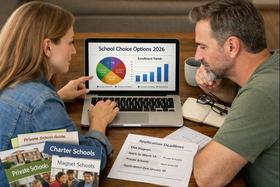Top Rankings
Bristol School District ranks among the top 20% of public school district in Tennessee for:
Category
Attribute
Overall Rank
Highest overall rank (Top 20%)
Math Proficiency
Highest math proficiency (Top 20%)
Reading/Language Arts Proficiency
Highest reading/language arts proficiency (Top 20%)
Science Proficiency
Highest science proficiency (Top 20%)
For the 2026 school year, there are 5 public preschools serving 1,746 students in Bristol School District. This district's average pre testing ranking is 9/10, which is in the top 20% of public pre schools in Tennessee.
Public Preschools in Bristol School District have an average math proficiency score of 51% (versus the Tennessee public pre school average of 41%), and reading proficiency score of 43% (versus the 37% statewide average).
Minority enrollment is 15% of the student body (majority Hispanic), which is less than the Tennessee public preschool average of 42% (majority Black).
Overview
This School District
This State (TN)
# Schools
9 Schools
890 Schools
# Students
4,082 Students
417,429 Students
# Teachers
265 Teachers
28,312 Teachers
Student-Teacher Ratio
15:1
15:1
Student By Grade
District Rank
Bristol School District, which is ranked within the top 20% of all 147 school districts in Tennessee (based off of combined math and reading proficiency testing data) for the 2022-2023 school year.
The school district's graduation rate of 84% has decreased from 93% over five school years.
Overall District Rank
#22 out of 147 school districts
(Top 20%)
(Top 20%)
Math Test Scores (% Proficient)
46%
34%
Reading/Language Arts Test Scores (% Proficient)
42%
37%
Science Test Scores (% Proficient)
51%
40%
Graduation Rate
84%
90%
Students by Ethnicity:
Diversity Score
0.26
0.61
% American Indian
n/a
n/a
% Asian
1%
2%
% Hispanic
5%
14%
% Black
2%
21%
% White
86%
58%
% Hawaiian
n/a
n/a
% Two or more races
6%
5%
All Ethnic Groups
District Revenue and Spending
The revenue/student of $12,300 is higher than the state median of $11,980. The school district revenue/student has stayed relatively flat over four school years.
The school district's spending/student of $11,481 is higher than the state median of $11,478. The school district spending/student has stayed relatively flat over four school years.
Total Revenue
$50 MM
$12,104 MM
Spending
$47 MM
$11,597 MM
Revenue / Student
$12,300
$11,980
Spending / Student
$11,481
$11,478
Best Bristol School District Public Preschools (2026)
School
(Math and Reading Proficiency)
(Math and Reading Proficiency)
Location
Quick Facts
Rank: #11.
Holston View Elementary School
(Math: 65-69% | Reading: 60-64%)
Rank:
Rank:
10/
Top 10%10
1840 King College Rd
Bristol, TN 37620
(423) 652-9470
Bristol, TN 37620
(423) 652-9470
Gr: PK-5 | 314 students Student-teacher ratio: 15:1 Minority enrollment: 13%
Rank: #22.
Haynesfield Elementary School
(Math: 55-59% | Reading: 45-49%)
Rank:
Rank:
9/
Top 20%10
201 Bluff City Hwy
Bristol, TN 37620
(423) 652-9292
Bristol, TN 37620
(423) 652-9292
Gr: PK-5 | 397 students Student-teacher ratio: 16:1 Minority enrollment: 18%
Rank: #33.
Avoca Elementary School
(Math: 55-59% | Reading: 45%)
Rank:
Rank:
9/
Top 20%10
2440 Volunteer Pkwy
Bristol, TN 37620
(423) 652-9445
Bristol, TN 37620
(423) 652-9445
Gr: PK-5 | 402 students Student-teacher ratio: 15:1 Minority enrollment: 10%
Rank: #44.
Fairmount Elementary School
(Math: 35-39% | Reading: 35-39%)
Rank:
Rank:
7/
Top 50%10
821 Virginia Ave
Bristol, TN 37620
(423) 652-9311
Bristol, TN 37620
(423) 652-9311
Gr: PK-5 | 365 students Student-teacher ratio: 13:1 Minority enrollment: 15%
Rank: #55.
Anderson Elementary School
(Math: 35-39% | Reading: 20-24%)
Rank:
Rank:
4/
Bottom 50%10
901 Ninth St
Bristol, TN 37620
(423) 652-9444
Bristol, TN 37620
(423) 652-9444
Gr: PK-5 | 268 students Student-teacher ratio: 12:1 Minority enrollment: 21%
Recent Articles

Back-to-School Tech & Online Learning Readiness Checklist
A 2026 guide to back-to-school tech & online learning readiness, helping families prepare devices, connectivity, skills, and safety.

How Public Schools Prepare for College in High School
Learn how public schools prepare for college and what parents should look for as students begin high school. Updated for 2026.

School Choice in 2026: What Parents Must Know
Explore how school choice is reshaping U.S. education in 2026, with updated trends, enrollment data, costs, policies, and practical guidance for parents.





